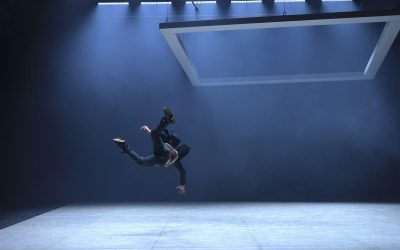Mike McCahill
Thu 20 June 2019
The Guardian ★★★★☆
The latest triumph from Film London’s Microwave scheme – the BFI and BBC Films programme that has produced such worthwhile investments as Hong Khaou’s Lilting and Eran Creevy’s Shifty – is an engrossing close study of a thirtysomething woman caught between two worlds, and two states of being.
American choreographer Bobbi Jene Smith plays Charlotte, a principal in a contemporary dance troupe whose preparations for a major show are dealt two blows in quick succession. First comes a positive pregnancy test, and the realisation the body with which she so forcefully expresses herself will undergo radical change. Second, there’s a call from her family, gathering round the hospital bed of her dying grandmother. A rehearsal-room prologue has already established Charlotte’s remarkable physical flexibility; what follows is a test of mental and emotional adaptability.
Writer-director Georgia Parris’s interest lies in those tensions that exist in certain bohemian-leaning families, rarely addressed head-on, yet always present (Joanna Hogg appears to be one influence here). Judicious enough to present us with both sides of this situation, the film-maker casts supremely sympathetic performers – Phoebe Nicholls and Madeleine Worrall – as Charlotte’s mother and sister, striving to hold their clan together while insisting that, whatever else they are, dance recitals aren’t quite life and death. Smith herself keeps shifting our responses, much as Charlotte pushes and pulls her troupe. This performer’s nervous vibration makes her solo scenes more immediately compelling than the hospital interactions, yet we understand how her relentless intensity might well drive mum and sis to look for jolly llama memes.
A few scenes around the grandmother’s cottage risk slipping into the same airlessness that dogs Hogg’s work; light and space comes naturally with a bigger budget. Nevertheless, Parris is way ahead of the game in her framing choices and sound design, and stirringly adventurous in her incorporation of dance into the rigid, humdrum everyday. One dream sequence ranks among the boldest imaginative leaps in recent British cinema, and there’s something very smart in the use of a floor exercise to comment on the drama of a self-sufficient woman having to feel her way through the business of dependency.
If you enjoyed Madeline’s Madeline despite its indie quirks, Parris’s carefully weighted debut may prove just the left-field ticket: there’s a lot of promise here, along with a startling level of achievement.



